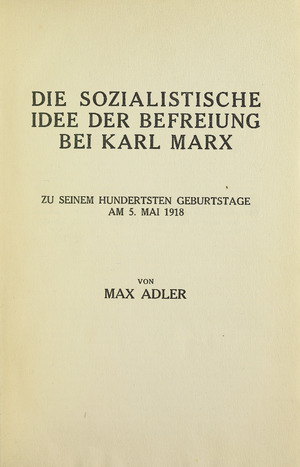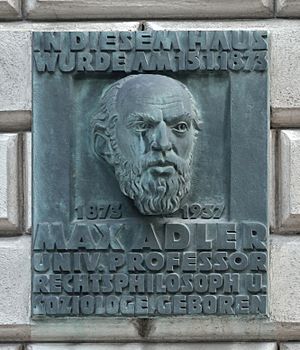Max Adler (Marxist) facts for kids
Quick facts for kids
Max Adler
|
|
|---|---|
| Born | 15 January 1873 |
| Died | 28 June 1937 (aged 64) Vienna
|
| Nationality | Austrian |
| Alma mater | University of Vienna (Dr.jur., 1896) |
| Era | 20th-century philosophy |
| Region | Western philosophy |
| School | Austromarxism |
| Institutions | University of Vienna |
|
Main interests
|
Social philosophy, educational reform, social democracy |
|
Influences
|
|
|
Influenced
|
|
Max Adler (born January 15, 1873 – died June 28, 1937) was an important thinker from Austria. He was a lawyer, a politician, and a social philosopher. His ideas were very important to a group called Austromarxism. Max was also the brother of Oskar Adler.
Max Adler's Life
Max Adler finished his law studies in 1896. He then became a professional lawyer. In 1919, he started teaching at the "Schönbrunn Circle." This was a special place for educational reforms.
The deputy mayor of Vienna, Max Winter, helped by providing rooms. These rooms were in the main building of Schönbrunn Castle. They were used by Kinderfreunde Österreich, which is an Austrian group for children and families.
At the Schönbrunner Erzieherschule, young people learned to be teachers. Max Adler and his friends, like Wilhelm Jerusalem and Alfred Adler, worked there. They put their ideas for practical educational reforms into action.
In 1920, he became a professor at Vienna University. He taught Sociology and Social philosophy. From 1919 to 1921, he was a member of the regional parliament. He represented the Social Democratic Party of Austria. Adler also worked in Adult Education. From 1904 to 1925, he helped edit a magazine called "Marx-Studien" with Rudolf Hilferding.
Max Adler's Ideas

Max Adler's first important writing was about Max Stirner in 1894. This work explored how socialism and individualism relate. Even though this book was not published at the time, Stirner's ideas influenced Adler throughout his life.
Adler wanted to work within the growing Social Democratic movement. He was careful when talking about Stirner. He saw Stirner as a "psychological counterpart" to Karl Marx. Adler believed that history was mainly about class struggle. He thought that theory and revolutionary action should work together.
Adler imagined that society would become more fair and perfect. He believed that the working class, called the proletariat, would lead a revolution. This would make their own interests match the good of all society.
Unlike some other thinkers, Adler saw the idea of "dialectic" as a way to study society. He did not see it as a special rule of history. He also thought that true Marxism was more about "social idealism" than just materialism. For Adler, Historical materialism became a way of understanding how people think about society.
Adler was very interested in how we understand society. He combined Marxist ideas with the philosophy of Immanuel Kant. Adler believed that our individual thoughts are already "socialized." This means that when we make a judgment, we are already thinking about what many other people might agree with.
Adler also shared his ideas about the state. He debated with other thinkers like Hans Kelsen. Adler said there was a difference between political democracy and social democracy. Political democracy, he felt, showed the power of the rich. Social democracy, however, would remove unfairness and social differences. It would be replaced by a society based on "solidarity."
Adler believed that a socialist society meant taking apart the old state system. He was a politician who did not compromise with "social chauvinism." This was a term for those who supported their own nation too much. He also disagreed with "reformism," which meant making small changes instead of big ones. The ideas of Austromarxism, which included Adler, Otto Bauer, and Rudolf Hilferding, were important for discussions on the left wing of German Social Democracy before 1933.
See also
In Spanish: Max Adler para niños
 | William L. Dawson |
 | W. E. B. Du Bois |
 | Harry Belafonte |


